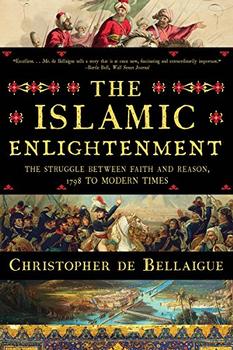Summary | Excerpt | Reviews | Beyond the Book | Readalikes | Genres & Themes | Author Bio
The Struggle Between Faith and Reason, 1798 to Modern Times

Critics' Opinion:
Readers' Opinion:
First Published:
Apr 2017, 432 pages
Paperback:
Aug 2018, 432 pages
 Book Reviewed by:
Book Reviewed by:
Lisa Butts
Buy This Book
One of the features of innovation in the nineteenth century was its telescoped quality. This compression of events was illustrated by the fact that the movable-type printing press, dating back to the fifteenth century, was introduced almost at the same time as the telegraph, invented in 1844.
For all his unwillingness to recognise change when he saw it, Edmondo De Amicis did in the pages of Constantinople proffer one description of violent transformation. The city was, he wrote in this exceptional passage, 'in the process of transformation, composed of ancient cities that are in decay, new cities which emerged yesterday, and other cities now being born; everything is in confusion; on every side can be seen the vestiges of gigantic works, mountains bored through, hills cut down, entire districts levelled to the ground'.
The story of Muslim modernisation has sometimes been depicted as the efforts of a few potentates to enforce alien precepts on resistant populations. Muhammad Ali, Egypt's viceroy for most of the first half of the nineteenth century, and his near contemporary (and nominal sovereign), Turkey's Sultan Mahmud II, were indeed both modernisers and martinets, and there were many instances of popular opposition to what were depicted as godless innovations.
That reforms as fundamental as these gave rise to controversy and opposition is no cause for astonishment. Modernity is even at the best of times a tension, dislocation and agitation, and (in a phrase by Nietzsche that expresses a kaleidoscopic weirdness of perspective) 'a fateful simultaneity of spring and autumn'. But the idea that modernisation had no natural constituency in the Middle East is inconsistent with the very nature of progress, which is generally articulated by a minority, meets with opposition or mirth, and finally overcomes obstacles before taking root. And although the principles of modernity and progress were introduced to the Middle East from the West, the fact that they had originated elsewhere was not in itself an obstacle to their adoption in this new environment. Contradicting assumptions of wilful Muslim backwardness, Islam did not show any more opposition to modernisation than Judaeo-Christian culture had done to its earlier iteration in the West.
As the authentic thrill felt by many of the characters in this book shows, ideas transfer best when they are perceived to be universal and not the business end of a hostile ideology. The sovereignty of the individual, the usefulness of hygiene and the fallibility of a crowned head (to name but three) carry no brand of exclusivity but can be understood by all. In fact, the Muslim world adapted itself to these values and many others much more rapidly than the West had devised them, albeit with changes of emphasis.
Indeed, when they fought back against the new ideas and practices, Muslim conservatives and reactionaries found that they could not stop change, only hope to tame and subdue it. From this came the seductive idea that modernity could be reduced to a limited series of propositions (and gadgets) that would invigorate the body of Islam without changing it. Islam would borrow some of the advances that the Westerners had devised in their off-hours from being disagreeable and impious. These ideas would be grafted onto the surface of things to make them work better, while underneath good old Islam went on, superior to anything the West had to offer. But this cherry-picking approach did not really work. When people bend themselves to thinking of new ways of doing things it becomes hard for them to give up this progressive way of looking at the world. Every practical effort in this direction seems to be handsomely repaid in the form of new conveniences, expanded horizons and a sense of exaltation and self-worth. Progress is its own propaganda.
For an idea of just how much Islamic society changed over the nineteenth century it suffices to look at the evolution that was experienced by Egypt's clerical establishment. In 1798, when Napoleon invaded Egypt, the sheikhs responded to the values and knowledge of the French with revulsion, and the main Egyptian chronicler of the invasion, Abdulrahman al-Jabarti, entreated God to 'strike their tongues with dumbness . . . confound their intelligence, and cause their breath to cease'.
Excerpted from The Islamic Enlightenment by Christopher de Bellaigue. Copyright © 2017 by Christopher de Bellaigue. With permission of the publisher, Liveright Publishing Corporation. All rights reserved.





The Flower Sisters
by Michelle Collins Anderson
From the new Fannie Flagg of the Ozarks, a richly-woven story of family, forgiveness, and reinvention.

The House on Biscayne Bay
by Chanel Cleeton
As death stalks a gothic mansion in Miami, the lives of two women intertwine as the past and present collide.

The Funeral Cryer by Wenyan Lu
Debut novelist Wenyan Lu brings us this witty yet profound story about one woman's midlife reawakening in contemporary rural China.
Your guide toexceptional books
BookBrowse seeks out and recommends the best in contemporary fiction and nonfiction—books that not only engage and entertain but also deepen our understanding of ourselves and the world around us.